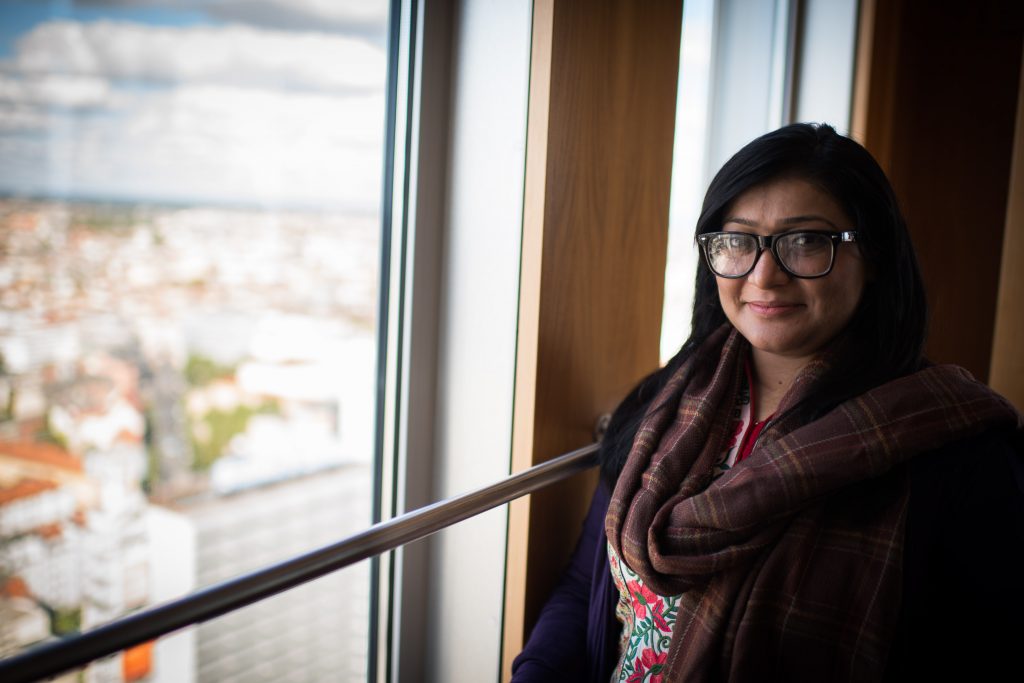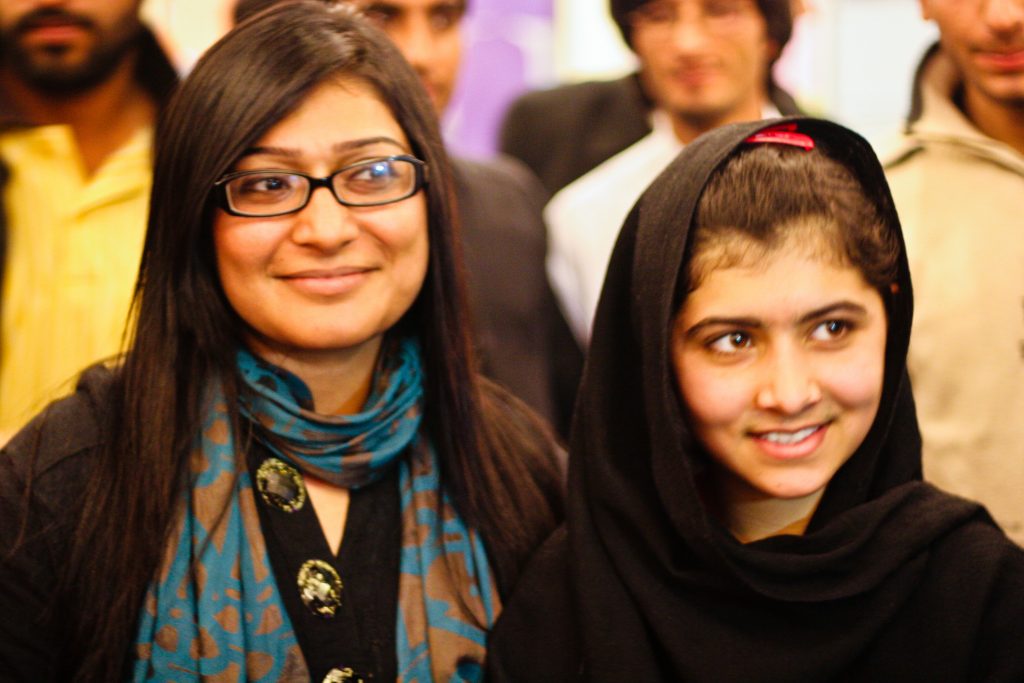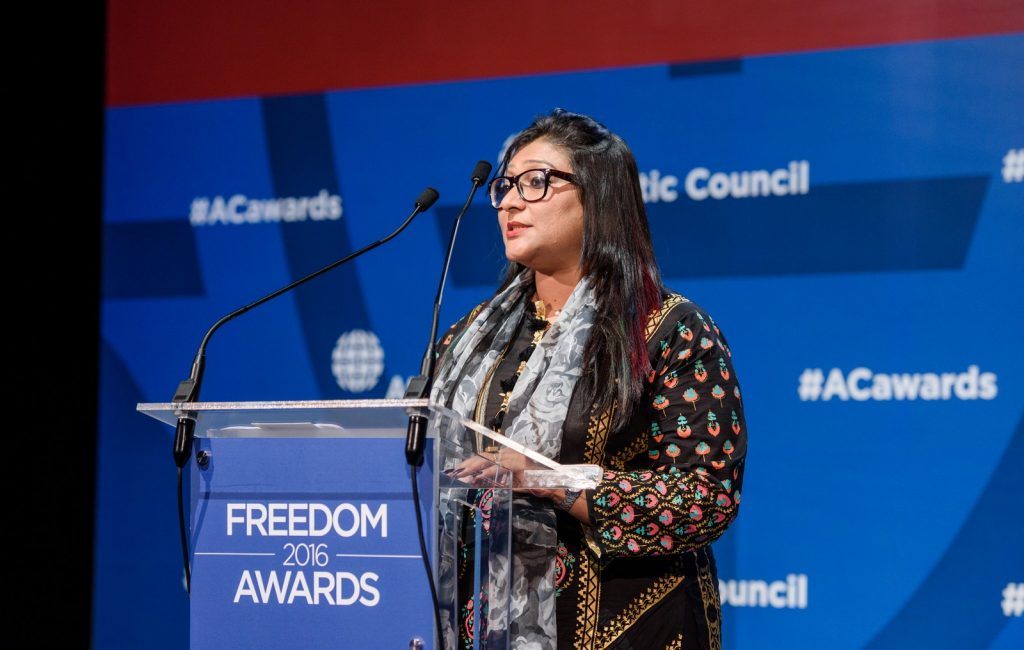Interview: Nighat Dad, Founder, Digital Rights Foundation
By Kunwar Khuldune Shahid | Interview | Published 8 years ago
Nighat Dad, the Founder and Executive Director of the Digital Rights Foundation (DRF), is a digital and human rights activist. She was listed as one of Time magazine’s Next Generation Leaders’ year. For good reason. In early 2016 she was awarded the Atlantic Council Freedom Award. And in November she won the prestigious Human Rights Tulip Award 2016 awarded by the Dutch government.
Dad has been a vocal critic of Pakistan’s cybercrime law, and has been leading the struggle for internet freedom in the country. In 2016, the DRF launched the Hamara Internet campaign, designed to generate awareness about online harassment. It has, so far, trained almost 2,000 young women, from various educational institutes, to deal with cybercrimes.
You won the prestigious Human Rights Tulip award in November last year. What are the biggest roadblocks against freedom of expression in Pakistan? Are any of these exclusive to the digital world?
In Pakistan, the biggest roadblock against freedom of expression is fear. And it has so many branches. There are people who can hurt you if they don’t agree; state actors that can hurt you for saying something wrong; non-state actors — I mean even your neighbour can decide they have a problem [with what you say]. This manifested itself in different ways in the digital sphere. Essentially, what the internet did was provide a safe space to many from vulnerable and marginalised communities where they could speak their truth. With the passage of the Prevention of Electronic Crimes Act, 2016 (PECA), what we are now looking at is another blasphemy law that could be used as a weapon against these communities. For instance, the blanket powers that the Pakistan Telecommunications Authority (PTA) has been given are absolutely unprecedented. Earlier, we had progressive pages disappear without reason — and now when it happens it will be legal. What is direly needed is judicial oversight, without which these laws are going to be put in the hands of whoever is in control at the time.
However, to highlight Pakistan as the only country that has issues with freedom of speech would be a little unfair. We have introduced problematic laws, yes, but then there’s England that just came out with its own law. The extent of surveillance powers that it hands to the government is very worrying.
What major changes does the much-scrutinised cybercrime law need for it to become compatible with universal human rights?
Currently, PECA 2016, as it stands, is quite vague and over-broad in its language. Some sections of the Act, regarding hate crimes and defamation, can be used to censor speech. The broad powers accorded to the PTA under section 34 of the Act, allow them to remove content on the basis of vague criteria such as the “glory of Islam” and “decency” or “morality.” These sections have the potential to have a chilling effect on free speech and freedom of expression.
Another major amendment should be in regard to the provision of more data protection, and the ability to be more privacy-friendly. The section relating to retention of data by internet service providers, for up to a year, is very worrying from a human rights perspective. It raises several questions regarding data protection, privacy and security of data held by the service providers.
The ambiguous verbiage that you mention with regards to many articles of the cybercrime law, can be found in the national Penal Code as well. As a lawyer, do you believe that the cybercrime law can be modified without addressing the problems in the Pakistan Penal Code (PPC)?
We need a holistic approach to the law, and in order to enact effective change, there should be a wholesale overhaul of the judicial system. In Pakistan, like many other jurisdictions, there is a patchwork of laws that apply to a single situation. As a result, the PPC affects all areas of criminal law. The regressive aspects of the PPC need to be part of the agenda of all digital rights activists.
Are there any clauses of the cybercrime law that successfully address the challenges of the modern digital world?
I think that the sections relating to harassment and cyber-bullying are a step in the right direction. They address a real need for those who bear the brunt of harassment online, particularly women, public figures and minorities. These sections will help create safe spaces for many users online — they take the threats of cyber harassment seriously for the first time. The implementation of these sections remains to be seen and will require serious action by the Cyber Crime Wing of the Federal Investigation Agency (FIA). However, they are a step in the right direction.
Do you believe the National Action Plan (NAP) has had any influence on the drafting of the cybercrime laws in Pakistan?
I think we currently live in a national security state, where our laws are influenced by the national security paradigm. The Protection of Pakistan Act (now lapsed) and the Twenty-First Amendment, along with PECA, are part of a series of laws that are supposedly aimed at security, but can simultaneously be used to seriously hamper civil liberties. Honestly, laws cannot be created based on the security state of a country at the time, laws are supposed to last a long time and are very hard to repeal.
Considering how terror-related activities have proliferated in Pakistan, how should the authorities address potential cyber-terrorism in the country?
Authorities need to focus on shifting the mindset of the people in the country instead of rendering their digital rights moot. Cyber-terrorism does not exist in Pakistan as an accident, and we are not innocent bystanders in this situation. What Pakistan seriously needs to do is help people address the general extremist mindset that we have. We need to take a cold hard look at our policies.
Tell us about the Hamara Internet Campaign that the DRF launched this year. What is the general level of understanding with regard to online harassment among women?
The Hamara Internet Campaign has many different facets; one was our campaign addressing young women in colleges and universities across Pakistan. When it culminates at the end of this year, the campaign will have trained close to 2,000 young women across the country. What we’ve found up till now is that women don’t really understand or acknowledge what harassment is. Generally, women are taught to be quiet, to ignore, to pretend it never happened. Think of it in terms of a woman who is walking down a street and gets cat-called by a man. Her modus operandi revolves around pretending nothing happened, and walking away. So when a bigger and more sinister form of harassment takes place, all she knows is how to stay silent. When it comes to the digital world, what women do is retreat. They simply shut down their online presence rather than fight back. Because women do not believe they own online spaces, exiting them becomes far too easy — and that is what the campaign is fighting against.
What do you think needs to be done to educate the masses, especially women — who are usually the major victims — with regards to online crimes? How much of the fight for women’s rights is fought in the cyber world?
I think almost all the things worth fighting for can be fought for online — but that’s probably because I’m a digital rights activist. I feel like the government really needs to take up this issue and work on mass campaigns. They need to enrich their reporting mechanisms with support systems that make it easier for women to come forward, and not vice versa.
Apart from that, educational institutes need to introduce digital literacy as a part of their curriculum. Children as young as two are using digital technologies, but there’s no effort to educate them on how to be good netizens.
It’s much easier to explain to an eight-year-old that their actions are harmful, than take up misogyny with adult men who would much rather hog online spaces for themselves.
How does the Hamara Internet helpline address these issues? What else does DRF have in store along similar lines?
The Cyber Harassment Helpline shall provide a safe, free and confidential service to victims of online harassment. It will provide legal advice, psychological support, referral and digital security assistance. The Helpline operated by the FIA does not have sufficient resources or women operators to help women at their most vulnerable. In this vacuum, we wish to offer a focal point for those facing harassment and violence online.
After the launch of our Helpline on December 1, we wish to hire more operators and expand the reach of the assistance that it provides. The organisation will be launching an app for victims of online harassment as well.
You have been heavily involved in the Qandeel Baloch murder case. What changes do we need in the cyber laws to protect online celebrities from mass harassment?
I don’t think it’s a question of how laws can protect online celebrities. The laws need to be able to protect all citizens equally. The laws are currently not people-friendly.
And honestly, it’s not even about the laws. You can bring about the best possible laws in the world, but if the mindset of the people is not changed then nothing really matters. What if we had amazing laws in place? What would that do? We should not be naïve enough to think that Qandeel’s brother’s ‘ghairat’ would have been any better contained because of them.
Finally, how do you think the government can facilitate you and other digital rights activists in the work that you’re doing for the country?
By helping us spread the word and by taking our help and building their own capacity.
For the first part, what the government needs to do is help us raise awareness with the masses about what the laws are, what their rights are, what the dos and don’ts are. It’s not okay to keep making law upon law that no one has ever heard of. You can’t throw someone in jail for vaguely-defined cyber-stalking, when they may not even know that what they did was cyber-stalking.
The second part involves the government really looking at its current processes. For example, when we have told our trainees to reach out to the FIA, we have been told horror stories about people from the FIA turning around and harassing the victims. The FIA has simultaneously done some incredible work to help victims too, but even one victim getting harassed is one too many. The government needs to have gender-sensitivity training, they need to build the capacity of these departments and give them more people — and they honestly need more women dealing with these issues instead of it just being a lot of men making all the decisions.
Kunwar Khuldune Shahid is a journalist and writer based in Lahore.





